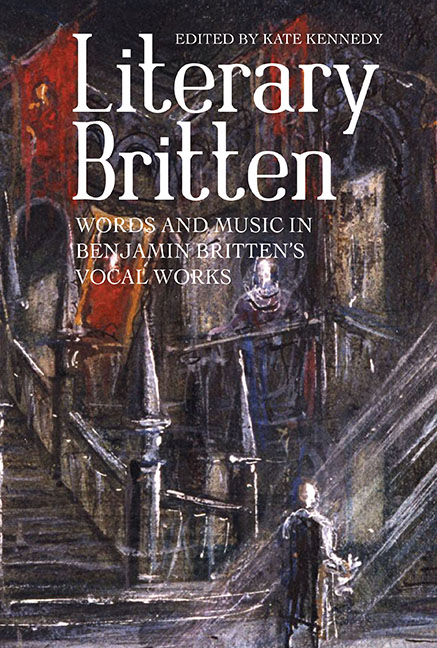Book contents
- Frontmatter
- Contents
- List of Illustrations
- List of Music Examples
- List of Contributors
- Introduction
- Part I Perspectives
- 1 Britten and His Librettists: The Composer as Auteur
- 2 Britten, Auden and the 1930s
- 3 James, Britten, Piper and the Literary Supernatural: The Changing ‘vision of evil’ in The Turn of the Screw and Owen Wingrave
- 4 ‘Thought's Wildernesses’: The Development of Britten's Nocturne from Library to Score
- 5 ‘Reading at Intervals’: Britten's Romantic Poetry
- 6 Britten's Drops: The Lyric into Song
- 7 ‘Without any tune’: The Role of the Discursive Shift in Britten's Interpretation of Poetry
- 8 Britten and Modern Tragedy
- Part II Studies
- Bibliography
- Index
1 - Britten and His Librettists: The Composer as Auteur
from Part I - Perspectives
Published online by Cambridge University Press: 17 July 2019
- Frontmatter
- Contents
- List of Illustrations
- List of Music Examples
- List of Contributors
- Introduction
- Part I Perspectives
- 1 Britten and His Librettists: The Composer as Auteur
- 2 Britten, Auden and the 1930s
- 3 James, Britten, Piper and the Literary Supernatural: The Changing ‘vision of evil’ in The Turn of the Screw and Owen Wingrave
- 4 ‘Thought's Wildernesses’: The Development of Britten's Nocturne from Library to Score
- 5 ‘Reading at Intervals’: Britten's Romantic Poetry
- 6 Britten's Drops: The Lyric into Song
- 7 ‘Without any tune’: The Role of the Discursive Shift in Britten's Interpretation of Poetry
- 8 Britten and Modern Tragedy
- Part II Studies
- Bibliography
- Index
Summary
‘“But this is my work, this is my work”, he repeated, and banged the table to emphasise the point.’ Such was the response of the frustrated Montagu Slater, librettist of Britten's Peter Grimes, to the composer's negative reaction on hearing – just one week before the opera's first performance – that Slater intended to publish his libretto in a form of which he alone approved, uncorrupted by all the practical revisions Britten had made to it in order to help the drama come to life vividly on the stage. As Philip Brett concluded in his pioneering investigation of the source materials for Grimes:
Slater cannot have been prepared for the consequences of writing for such a strong-willed composer. For what this story shows is that despite the comments, helpful or otherwise, of his team of supporters … and all the discussions, fruitful or unfruitful, it was Britten himself who made all the decisions, whether at his composing desk or later between rehearsals. Opera is ultimately a musical form. The composing history of Peter Grimes illustrates that fact, throws light on the historically difficult relationship of composer and poet, and demonstrates in a very telling way how an opera composer must take charge of his text.
Brett, who here refers to Britten's team of advisers as ‘supporters’ rather than ‘collaborators’, explicitly suggests that the composer was the omnipotent guiding genius behind the project. Such an auteurist view of opera composition is currently one of the least fashionable ways of approaching the medium.
Yet in the case of Britten, his dealings with his various librettists – often chronicled in considerable detail in his voluminous correspondence – reveal that this is precisely how he himself viewed his role, his input into the premiere productions of his stage works also embracing vital contributions to broader aspects of stagecraft and visual presentation. Such controlling tendencies resulted in his notorious resistance to later, alternative interpretations of his operas, with the first productions always regarded as definitive. ‘I take complete responsibility for the planning of the opera’, he wrote to fellow composer William Alwyn on the subject of Owen Wingrave, and told an interviewer who asked him about The Turn of the Screw: ‘I always have the greatest say in shaping my operas, and could claim the credit, if that's the word, for their form.
- Type
- Chapter
- Information
- Literary Brittenwords and music in benjamin britten's vocal works the boydell, pp. 10 - 30Publisher: Boydell & BrewerPrint publication year: 2018

